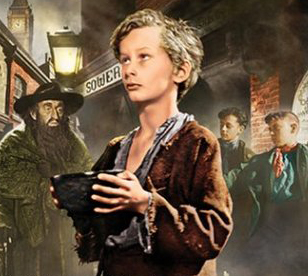
Twisting Dickens:
Analyzing David Lean's Adaptation of Oliver Twist
Home
Critical Essay
Bibliography
Related Web Links
Last Updated: 12/12/2008
Bibliography
Cartmell, D., Whelehan, I., Eds. Adaptations: film text to screen, screen to text.London; New York: Routledge, 1999.
This work served as a reference when comparing Dickens's novel Oliver Twist to the David Lean film adaptation. A great resource when researching the topic of text-to-film adaptation.
Jackson, Lee. The Victorian Dictionary. 15 Nov. 2001. 2 Dec. 2008 <
<http://www.victorianlondon.org>.
This site assists researchers and enthusiasts as to the lives and times of Victorian England. Based on the information of this site, we were better enabled to see the types of situations and information Dickens was hoping to portray.
Wikimedia Productions. “David Lean.” Wikipedia.27 Nov. 2008. 3 Dec. 2008.
<http://en.wikipedia.org/wiki/David Lean>.
This site provided a reference point for the life of David Lean and the themes which he focused on at the time of his adaptation of the novel Oliver Twist.
McKee, Al. "Art or outrage? Oliver Twist and the flap over Fagin." Film Comment.
v. 36 no. 1 (2000):40-1+. HWWilson Web. UW-Stevens Point Learning
Resources Center, Stevens Point, WI. 12 Dec. 2008.
<http://vnweb.hwwilsonweb.com.ezproxy.uwsp.edu/hww/results/getResults.jhtml?
_DARGS=/hww/results/results_common.jhtml.20>.
This article provided an outside opinion as to the characterization of Fagin in Dickens's novel versus the characterization of Fagin in the film adaptation of director David Lean.
Daly, Steve. "Polanski’s Latest Twist." Entertainment Weekly no. 842 (2005): 62-
65 OmniFile FT Mega (Wilson). HWWilson Web. UW-Stevens Point Learning
Resources
This source provided insight as to the vision of Roman Polanski, who also chose to adapt the Dickens tale of Oliver Twist. Polanski, like Lean, used modern technology to adapt his film to fit the expectations of his modern audience.